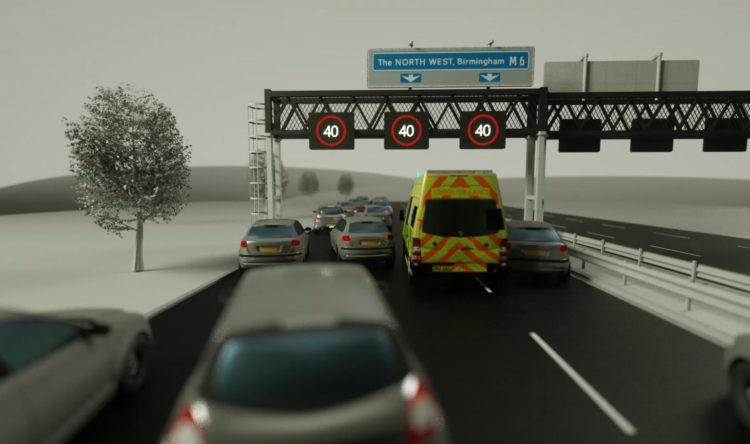Top driving anxieties
As lockdown restrictions recede drivers begin to worry
There is light at the end of the tunnel that is lockdown with Boris Johnson announcing his roadmap. Gradually the country looks set to open back up. It’s anticipated that we will be out on the roads more as offices reopen, along with non-essential retail and outdoor hospitality.
Some people, however, are worried about getting back behind the wheel on a regular basis after lockdown. This is especially true if they haven’t had many reasons to drive over the best part of the year. Losing confidence behind the wheel is more common than we might think.
Looking at Google search data from January 2020 to December 2020, Collingwood Insurance has investigated what UK drivers are most worried about.
Motorways
Motorway anxiety is the most common for drivers in the Midlands, South East, Scotland, Northern Ireland, Yorkshire, South West, and London.
Variations in searches include “panic attacks driving on motorways”, “fear of motorway driving”, “phobia of driving on highways”, “scared of driving on motorway”, and “anxiety about driving on highway”. The region which was searching the most on this concern was the South West, 1,000% above the average.
Did you know that the fear of driving is the fifth most common phobia in the UK? Certain situations can trigger feelings of fright, which appears to be dominated by fear of merging and driving on a motorway.
Research by Nissan found that over half of drivers worried that they’d get trapped in between other vehicles. Meanwhile, 43% were nervous about overtaking larger vehicles like lorries.
It seems that many of us will avoid situations we find stressful. Eight million of us take to the motorway rarely and around 380,000 avoid it completely. Some of us are prepared to detour as far as 26 miles to drive on smaller, less busy roads.
It’s possible that such high levels of anxiety around motorways because learner drivers weren’t allowed on motorways until 2018. Although the law has changed to give learner drivers experience in this area, those who passed their test before 2018 weren’t given lessons on motorways. They missed this experience under supervision and are still struggling with nerves. However, motorways remain the safest road type in the UK.
Fear of driving
Searches around driving anxiety in general is common across all regions in the UK. Searches include “afraid of driving a car”, “fear of driving”, “being scared to drive”, “driving anxiety symptoms”, “how to overcome driving anxiety”, “fear or driving in traffic”, “teenage driving anxiety”, and “driving anxiety medication”.
The Midlands and Yorkshire had the highest growth of anxiety searches, both increasing 200 per cent.
In the East of England, “phobia for driving a car” searches were 1,000% over the average.
Physiological effects of driving anxiety include sweaty palms, a racing heartbeat and shaking. This can seriously hinder driving ability and affect driver judgement when on the road. Ironically, it is this fear that can put road safety under pressure. Low confidence can place drivers in a vulnerable position and reduce confidence further in a vicious cycle.
The weather
There were several concerns about driving in cold and wet weather, with searches for:
- “Winter driving anxiety” in Scotland at 1,000% over the average
- “Phobia of driving in the rain” in Yorkshire, the East of England, and London at 89%, 340%, and 371% and over the average, respectively
- “Anxiety driving in the snow” at 520% over the average in Wales.
Weather in the UK can be unpredictable, with one day warm and unseasonable, the next sub zero with fears of ice and snow. Sudden heavy rain and hail storms can severely hamper driving conditions. These can cause concern for drivers who have less confidence and little experience.
Learning to drive
Unsurprisingly, there were concerns over feeling nervous about driving lessons. Searches for “nervous about driving lessons” increased 100% in the North West, 67% in the Midlands, and 50% in Yorkshire.
Learning to drive will make every budding learner driver nervous. Of course, for some this can be mixed with youthful bravado, which can be a dangerous combination.
Nervous learners could be recommended the following to help calm them:
- Have a nutritious breakfast to set you up for the day. You don’t want the nerves to get the better of you when you’re hungry, as this can affect your energy and concentration.
- Don’t drink the night before your lesson. Get a good night’s sleep.
- Get yourself familiarised with the car’s controls, including the clutch, gearstick, and handbrake. If you know anyone that has passed their test and has a car, ask them if they can show you the basics. If not, YouTube is a wonderful resource for all sorts of needs, including driving lessons. Get ahead of the game by watching some videos.
- Wear something comfortable and suitable to drive in.
- Don’t worry about any mistakes you’ll make. Mistakes are supposed to happen during driving lessons so that you can learn – your instructor will have seen them all before. Don’t forget that your driving instructor will have pedals on their side so that they can help you if you need it.
- If your parents or carers have a car, they can obtain learner driver insurance so you can get some practice outside of your lessons too!






